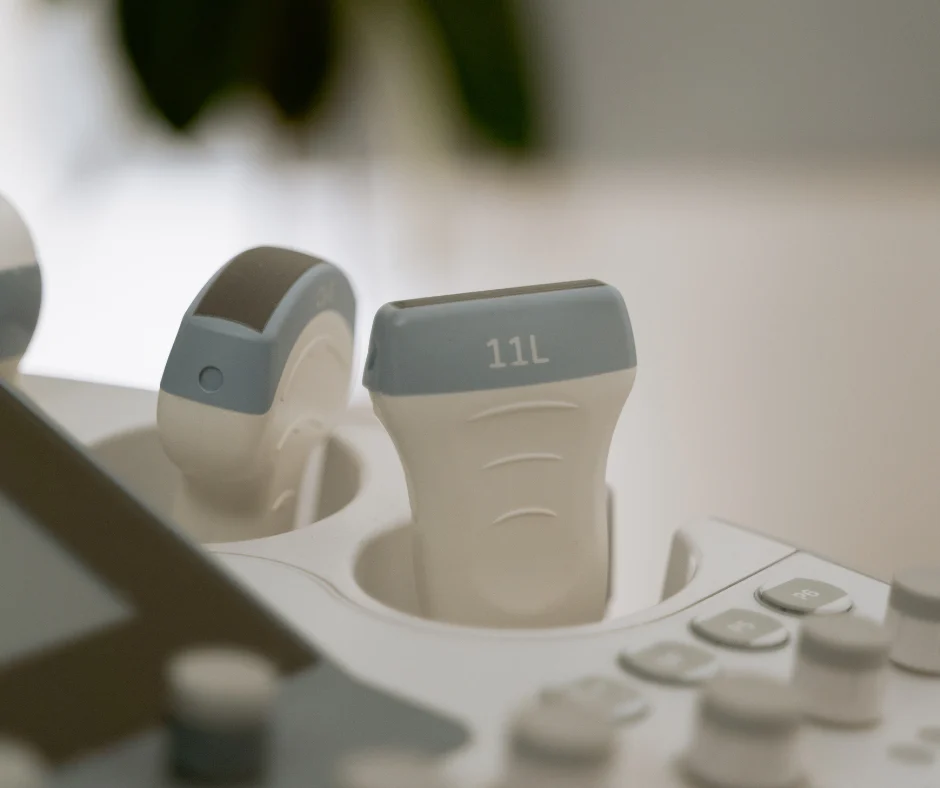Thyroid screening plays a vital role in evaluating the health of the thyroid gland. It is particularly when it comes to detecting nodules, cysts, and abnormal growths. These screenings are often ordered when a patient presents with symptoms. These are neck swelling, difficulty swallowing, hoarseness, or unexplained hormonal imbalance. The thyroid gland, located in the front of the neck, regulates essential body functions through hormone production. When its structure is compromised by nodules or enlargement, these screenings become essential for timely diagnosis and intervention. At TrueView Ultrasound, our ultrasound screening services offer a non-invasive and accurate way. This is to assess thyroid health and support clinical decision-making.
How Thyroid Screenings Are Performed
Thyroid screenings typically begin with a physical examination. It is followed by imaging procedures like ultrasound to gain a clearer view of the gland’s internal structure. Ultrasound is the most commonly used tool for evaluating thyroid abnormalities. It is because of its ability to detect both small and large nodules without exposing the patient to radiation. During the ultrasound, a high-frequency transducer is gently moved over the neck to capture real-time images of the thyroid. This allows physicians to identify nodules, measure their size, assess their consistency, and detect irregular features. It may suggest that further evaluation is necessary. At TrueView Ultrasound, our team uses advanced technology. This is to provide accurate and detailed thyroid imaging that informs safe and effective next steps.
Why Detecting Thyroid Nodules Early Is Important
Thyroid nodules are quite common, particularly in individuals over the age of 50, and many are discovered incidentally during routine health exams. According to the American Thyroid Association, nearly 60% of people will have a thyroid nodule by the time they reach 60 years old. Although most nodules are benign, some can be cancerous or interfere with normal thyroid function. Early detection through screening allows healthcare providers to monitor changes over time and intervene promptly if suspicious growth patterns are observed. In some cases, additional testing such as fine-needle aspiration biopsy, may be recommended if a nodule appears irregular or continues to grow.
Key Features Identified During Thyroid Screening
During a thyroid ultrasound, several characteristics of a nodule are evaluated to determine the risk level. These include its size, shape, margin definition, internal composition (solid or cystic), and presence of calcifications. Increased vascularity or irregular borders can be indicators of malignancy. Our team at TrueView Ultrasound is trained to identify these features accurately using comprehensive diagnostic ultrasound protocols. Identifying these signs early provides a strong foundation for appropriate clinical follow-up and personalized treatment planning.
When Thyroid Screening Is Recommended
Thyroid screening may be recommended in a variety of circumstances, including abnormal blood test results, a palpable lump in the neck, a family history of thyroid disease, or unexplained symptoms such as fatigue, weight fluctuations, or cold intolerance. It is also commonly ordered for individuals who have previously had thyroid nodules or undergone thyroid surgery. If you are preparing for a thyroid ultrasound, our detailed guide on ultrasound preparation in Roseville outlines everything you need to know prior to your visit, including how to position yourself comfortably for the scan.
Comparing Ultrasound with Other Thyroid Evaluation Methods
While blood tests can provide information about how well the thyroid is functioning, they do not offer insight into the gland’s physical structure. Imaging, and particularly ultrasound, bridges this gap by enabling visualization of tissue abnormalities that may not yet be impacting hormone levels. In comparison to other imaging techniques like CT or MRI, ultrasound is more affordable, accessible, and free from ionizing radiation. This makes it ideal for routine monitoring of thyroid nodules or follow-up after treatment. For patients in Roseville and surrounding areas, our team offers expert evaluations supported by advanced imaging technology and personalized care.

Ongoing Monitoring and Clinical Implications
Thyroid nodules that are found to be benign typically require ongoing monitoring to detect any changes in size or characteristics. Follow-up ultrasounds are scheduled at intervals based on initial findings, allowing providers to reassess and make decisions about future care. Our compassionate and skilled staff at TrueView Ultrasound partners with referring physicians. This is to ensure every patient receives the most appropriate imaging and follow-up. This approach not only supports early diagnosis but also promotes peace of mind through continuous care.
Conclusion and Next Steps
Thyroid screening through ultrasound is one of the most effective methods for detecting nodules, cysts, and early signs of thyroid disease. It provides a safe, non-invasive way to identify structural abnormalities that might not present symptoms until later stages. With millions of people affected by thyroid disorders each year, proactive screening is a smart and essential part of managing long-term health. By using modern diagnostic techniques and a personalized care approach, TrueView Ultrasound plays a vital role in supporting thyroid wellness for patients across all age groups.
If you or your physician has concerns about your thyroid, it is wise to schedule a screening promptly. At TrueView Ultrasound, we are committed to delivering precision diagnostics and compassionate care through advanced thyroid imaging and ultrasound services. Our expert team is here to help you gain clarity about your thyroid health and guide you toward informed medical decisions. Contact our clinic today to take the next step toward peace of mind and proactive health management.
